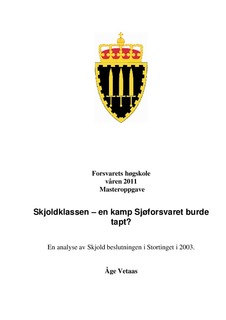| dc.description.abstract | The Skjold-class – a battle the Navy should have lost? This qualitative study seeks to broaden the understanding of political decision making concerning defence spending. The Skjold-class Fast Patrol Boats (FPB) were planned and developed during the Cold War period. A prototype was built and handed over to the Navy in 1999. The defence study from year 2000 performed by Chief of Defence General Sigurd Frisvold did not find economical resources enough to include the FPBs in the structure. Other elements got a higher priority. Based on this the Norwegian Congress was to decide whether to build the series or not. The decision in 2003 to start building the ships is interesting, because it can be seen as contra-intuitive. To analyse this decision three organizational models, developed by Graham Allison, were used: Model 1: The Rational Actor Model 2: The Organizational Process Model 3: Bureaucratic Politics The result of the study is that the hypothesis developed from Model 1 has low explanatory power with regards to the decision. The analysis of Model 2 however, indicates that there is logic of appropriateness with regards to replace existing FPBs with new FPBs of a more modern type. On the third arena, the arena of politics, the findings are that economic interests from the industry, the Navy and the importance of industry jobs, also influenced the decision. | en_US |
